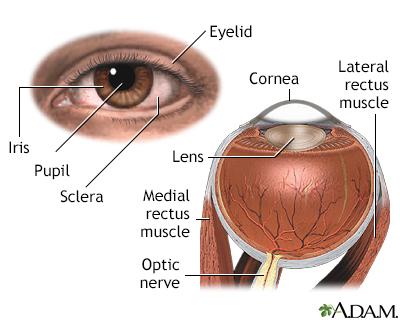Diabetes eye exams
Diabetic retinopathy - eye exams; Diabetes - eye exams; Glaucoma - diabetic eye exam; Macular edema - diabetic eye exam
Images


Description
Diabetes can harm your eyes. It can damage the small blood vessels in your retina, the back wall of your eyeball. This condition is called diabetic retinopathy.
Diabetes also increases your risk of glaucoma and other eye problems.
You may not notice that your eyes are damaged until the problem is very bad. Your eye doctor can catch problems early if you get regular eye exams. This is very important. The early stages of diabetic retinopathy don't cause changes in vision and you won't have symptoms. Only an eye exam can detect the problem, so that steps can be taken to prevent the eye damage from getting worse.
You Need Regular Eye Exams
Even if the health care provider who takes care of your diabetes checks your eyes, you need an eye exam every 1 to 2 years by an eye doctor who takes care of people with diabetes. An eye doctor has equipment that can check the back of your eye much better than your regular provider can.
If you have eye problems because of diabetes, you will probably see your eye doctor more often. You may need special treatment to prevent your eye problems from getting worse.
You may see two different types of eye doctors:
- An ophthalmologist is a medical doctor who is an eye specialist.
- An optometrist is a doctor of optometry. If you develop eye disease caused by diabetes, you will likely also see an ophthalmologist.
What is a Dilated Retinal Exam?
The doctor will check your vision using a chart of random letters of different sizes. This is called the Snellen chart.
You will then be given eye drops to widen (dilate) the pupils of your eyes so that the doctor can better see the back of the eye. You may feel stinging when the drops are first placed. You may have a metallic taste in your mouth.
To see the back of your eye, the doctor looks through a special magnifying glass using a bright light. The doctor can then see areas that may be damaged by diabetes:
- Blood vessels in the front or middle parts of the eye
- The back of the eye
- The optic nerve area
Another device called a slit lamp is used to see the clear surface of the eye (cornea).
The doctor may take photos of the back of your eye to get a more detailed exam. This exam is called a digital retinal scan (or imaging). A special camera is used to take photos of your retina without dilating your eyes. The doctor then views the photos and lets you know if you need more tests or treatment.
After Your eye Exam
If you had drops to dilate your eyes, your vision will be blurred for about 6 hours. It will be harder to focus on things that are near. You should have someone drive you home.
Also, sunlight can damage your eye more easily when your pupils are dilated. Wear dark glasses or shade your eyes until the effects of the drops wear off.
References
American Academy of Ophthalmology website. Diabetic retinopathy PPP 2019. www.aao.org/preferred-practice-pattern/diabetic-retinopathy-ppp. Updated October 2019. Accessed October 31, 2022.
American Diabetes Association website. 12. Retinopathy, neuropathy, and foot care -2022. Diabetes Care. 2022;45(Suppl 1):S185-S194. PMID: 34964887 pubmed.ncbi.nlm.nih.gov/34964887/.
Brownlee M, Aiello LP, Sun JK, et al. Complications of diabetes mellitus. In: Melmed S, Auchus, RJ, Goldfine AB, Koenig RJ, Rosen CJ, eds. Williams Textbook of Endocrinology. 14th ed. Philadelphia, PA: Elsevier; 2020:chap 37.
Skugor M. Diabetes mellitus. In: Sadda SVR, Saraff D, Freund KB, et al, eds. Ryan's Retina. 7th ed. Philadelphia, PA: Elsevier; 2023:chap 48.
BACK TO TOPReview Date: 8/12/2022
Reviewed By: Sandeep K. Dhaliwal, MD, board-certified in Diabetes, Endocrinology, and Metabolism, Springfield, VA. Also reviewed by David C. Dugdale, MD, Medical Director, Brenda Conaway, Editorial Director, and the A.D.A.M. Editorial team.

Health Content Provider
06/01/2025
|
A.D.A.M., Inc. is accredited by URAC, for Health Content Provider (www.urac.org). URAC's accreditation program is an independent audit to verify that A.D.A.M. follows rigorous standards of quality and accountability. A.D.A.M. is among the first to achieve this important distinction for online health information and services. Learn more about A.D.A.M.'s editorial policy, editorial process and privacy policy. A.D.A.M. is also a founding member of Hi-Ethics. This site complied with the HONcode standard for trustworthy health information from 1995 to 2022, after which HON (Health On the Net, a not-for-profit organization that promoted transparent and reliable health information online) was discontinued. |
The information provided herein should not be used during any medical emergency or for the diagnosis or treatment of any medical condition. A licensed medical professional should be consulted for diagnosis and treatment of any and all medical conditions. Links to other sites are provided for information only -- they do not constitute endorsements of those other sites. © 1997- 2024 A.D.A.M., a business unit of Ebix, Inc. Any duplication or distribution of the information contained herein is strictly prohibited.
